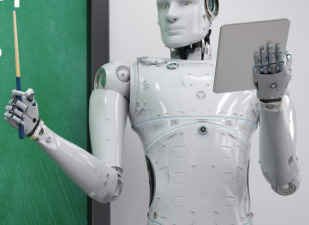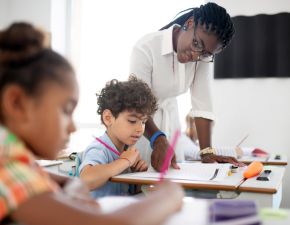The educational work of teachers is not only about imparting knowledge, but also about humanistic care and value guidance for students. This kind of care and guidance is difficult for artificial intelligence to imitate.
The rapid development and market application of artificial intelligence has impacted many professions across various sectors, including school teachers. Teachers face challenges in transforming their roles and enhancing their capabilities in the age of artificial intelligence. While AI products can directly or indirectly present and demonstrate knowledge to students, they are unlikely to cultivate creative personalities. Creative personalities encompass qualities such as responsibility, curiosity, courage, self-confidence, and altruistic values.

Artificial intelligence can help students achieve personalized learning, but lacks emotion
Nowadays, education is basically large-class teaching. How much knowledge can be learned depends on personal understanding ability, but truly qualified education needs to teach students in accordance with their aptitude and carry out different courses for different students. The uneven distribution of educational resources is something that cannot be avoided now, but Larry Hedges from Northwestern University and Anant Agarwal, founder of edX, said that smart AI teachers are expected to change this dilemma. Every student has his or her own field of expertise. If only one teacher is assigned to dozens of people, it is difficult to meet the personalized needs of students. However, through artificial intelligence technology, smart AI teachers can form specific courses for each student and let him or her learn more useful knowledge. However, artificial intelligence education does not have the delicate emotions of human teachers, so it is still insufficient in observing the status of students.
Artificial intelligence can quickly score students, but ignores the bright spots
If artificial intelligence education is applied to practice, then the judgment of students will definitely be handed over to machines. Agarwal once conducted an interesting experiment on grading students. He used artificial intelligence technology on the edX platform to grade 100,000 papers. Although the speed was very fast, the final grading results puzzled both teachers and students. Because the machine's recognition ability is not perfect enough, the grading standards are very rigid, and the bright spots in the students' papers cannot be seen. They are only graded according to some specific standards. Therefore, if artificial intelligence education wants to be truly applied to reality, it is still worth studying how to accurately judge students, otherwise a special teaching team must be equipped to judge students' grades.

Artificial intelligence lacks innovation ability
As far as current technology is concerned, artificial intelligence has not yet reached the point where it can continue to innovate, and it is only engaged in mechanical work in many industries. Although artificial intelligence education has the possibility of replacing human teachers, it still needs to imitate human intellectual behavior and establish various models based on human intelligence. Although it can also be explored in a certain way, without human intelligence models and behavior patterns for reference, artificial intelligence education still has no ability to innovate. In terms of narrative ability, AI education is also lacking. Its way of expression is formed by integrating people's daily conversations. For some clichés and speaking skills, AI education has not yet been able to achieve this.
The application of AI in the field of education has brought new opportunities and challenges to education, but it cannot replace the core position and role of teachers in the education process. In the future, teachers and AI will form a collaborative teaching model to jointly promote the all-round development of students. Therefore, teachers do not have to worry about being replaced by AI, but should actively embrace technological changes and continuously improve their professional quality and teaching ability to adapt to the development needs of future education.


